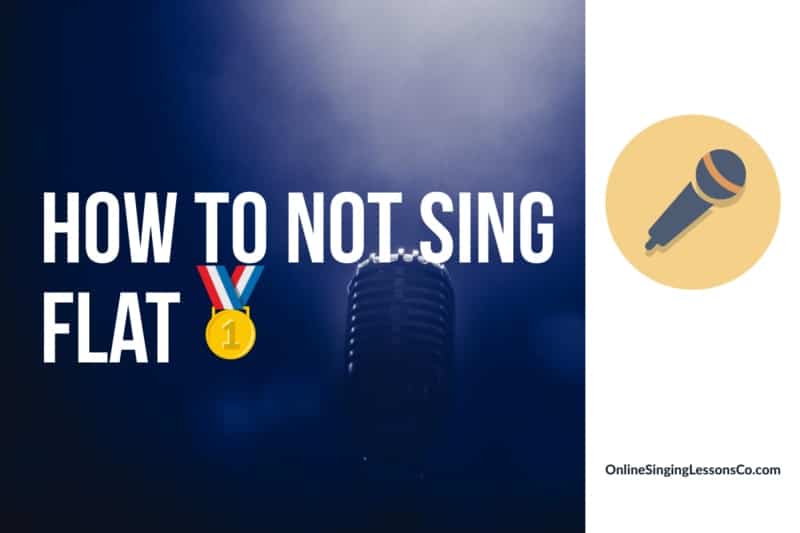How to Not Sing Flat – 5 PRO Tips🥇(Jul 2025)

In this article we’re going to be talking about how to not sing flat when singing low, middle range and high notes.
Whether you believe it or not, the technique for singing low notes without going flat, is the same for high notes, so the tips and techniques within this article will really help you master your vocal pitch, throughout your range.
How to Not Sing Flat – Top 5 Tips & Techniques
1. Calibrate your ears
The first tip to master your ability to sing on key is to improve your pitch awareness skills.
What do we mean by this?
Well, to put it simply, how does a singer determine the pitch that he/she needs to sing? They hear the accompanying instrument or vocal track, and if they are familiar with the vocal melody, will automatically know the pitch that they need to sing.
For some this is enough, but for others who are potentially less experienced singers, they need to listen to the vocal track on more occassions, and study the lead vocal melody before attempting it themselves.
This leads to our next tip!
2. Record Yourself whilst Singing
Ok, let’s say that you’ve found a song that you’re familiar with, now the tip is to simply record yourself singing the song.
Try to isolate the vocal recording from the background music/instrument, so it’s clearer when listening back.
The reason for this, is that listening to a recorded version of your voice (with the accompanying music playing alongside or not) gives you a true impression of the vocal tone, timbre, and pitch… Moreso than how you hear it when you sing.
Why is this? Because when you listen to yourself without recording, your ears are also hearing the vibrational frequencies created as the sound waves travel through your face, neck, and jaw.
Therefore, you’ll get a true sense of clarity when it comes to how others hear your vocal tone and pitch by listening to a recording.
You can then dissect the vocal performance, if you have a keyboard or guitar (which is in perfect tune), by comparing the off-pitch notes to the frequency that they should be… In other words, you’re teaching your ear how to recognise the difference between the pitch that you sang, and the one that you actually wanted to sing.
3. Get Taught by a Professional and Learn to Sing
What is the best way to learn anything is through someone teaching you, and why is this? Well, you can utilize someone else’s wealth of experience, to learn tried and tested methods, without wasting your time failing.
In this case, you’ll want to learn from a singing instructor, who will teach you correct singing posture, techniques, vocal warmups, scales, and much more.
Given the present situation, we recommend that you take online singing lessons, and one provider which we particularly like is 30 Day Singer, which is both highly reputable and very affordable. Not to mention they provide a 14-Day Free Trial of their service, and even if you decide to sign up, if you’re not satisfied by your results within 30 days, they’ll give your money back to you, guaranteed!
There are other benefits to using such online programs, given that you don’t actually need to be able to play an instrument, instead, the vocal teacher plays the piano and you can sing along with her (for learning scales and vocal exercises).
4. Learn Vocal Exercises
Learning vocal exercises is incredibly important! An athlete would not run a marathon without firstly warming up and training hard for weeks beforehand. It’s the same with singers!
Think of vocal exercises as being routine training for your vocal cords, to build up muscle memory and vocal stamina.
How does this relate to keeping your vocals from being flat?
Well, an untrained and unpracticed singer will likely begin to strain whilst singing, as they lack the proper vocal foundations, and it’s this issue that leads to vocal cord damage and ultimaltey not being able to stay on pitch.
5. Develop a Vocal Routine for Good Vocal Health
As we suggested in the previous tip, vocal health is highly important to maintaining a good quality voice and singing in key.
To do this over a long period of time, a singer must develop a good singing regime, practicing 3+ times per week, using a structured approach to warming up the voice, exercising, and warming down the voice. This is why we recommend taking singing lessons, so that you know the best way to exercise and maintain your voice.
To Conclude
By following the tips that we’ve outlined above, you’ll be able to learn how to properly use and maintain your voice. This will ultimately help you not to sing flat, but to sing perfectly in key with the music. Not only this, but you’ll also find singing becomes easier and more enjoyable!
If you have any questions about how to not sing flat, or any other questions around this topic, please feel free to leave them below.